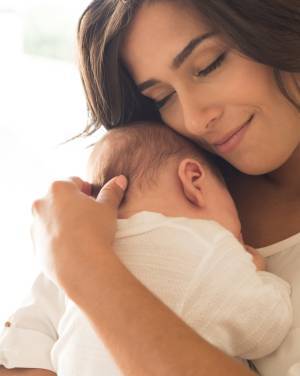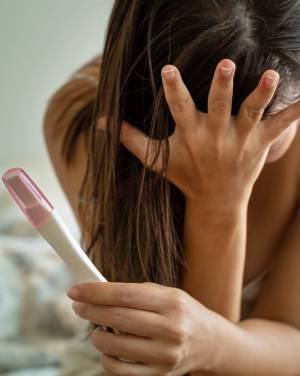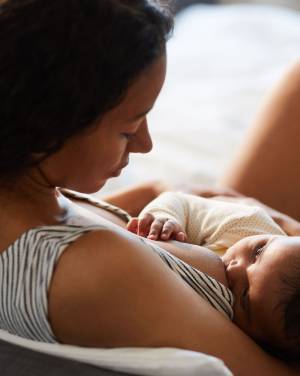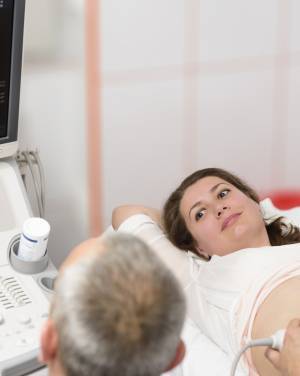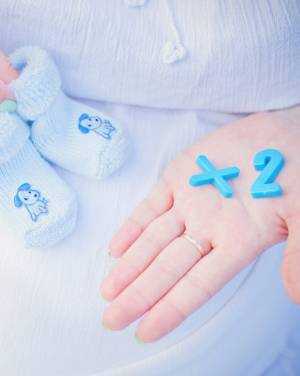Is It Dangerous to Be Pregnant Soon After a C-Section?
🤱 Pregnant again after a C-section — too soon? Take the self-evaluation!
- After a properly performed C-section, the healing process is usually completed after three months.
- Nevertheless, many physicians advise waiting a year after a Cesarean before trying for another baby.
- Pregnancies that occur within weeks or months of a C-section receive extra medical attention to ensure that mother and baby are safe.
This article explains what you need to know about getting pregnant and giving birth after a C-section.
Pregnant Again After C-Section: Too Soon? — Your Self-Evaluation
Do you find yourself in this situation? Answer three multiple-choice questions about your circumstances and receive an expert evaluation within seconds on your screen.
Pregnancy After a Cesarean
You probably still remember what the C-section delivery of your baby was like. Perhaps it was not even that long ago. Now you're pregnant again — and are wondering: How will this turn out? Can a previous C-section affect this pregnancy? What do I need to look out for?
When Is It Okay to Get Pregnant Again?
A Cesarean section is a surgery that takes a while to heal from. Many OB/GYNs advise waiting one year after a C-section before becoming pregnant again. This is only a broad recommendation.
Pregnant Again Right After a C-Section
What if you get pregnant before the three months are up? This does not automatically constitute a medical emergency for you or your child.
It is not advisable to try for another baby so soon after a C-section. However, if you find yourself pregnant within three months of a C-section, modern medicine has made it possible for you to have a smooth pregnancy without any significant complications.
The most important thing is that you receive good medical care — from a competent and empathetic OB/GYN. Close supervision makes early intervention possible.
What Are the Specific Risk Factors?
A previous C-section puts you at a slightly higher risk for certain pregnancy complications in subsequent pregnancies.
The uterus could tear along its scar (uterine rupture). Placenta previa is also more likely to develop. This means that the placenta, through which the baby is supplied with nutrients, is positioned in the wrong place, blocking the baby's path into the birth canal.
However, these complications are very rare.
To guard against these risks, you will probably have more frequent pregnancy check-ups. Find out more about high-risk pregnancies and what it means if your pregnancy is considered “high-risk”:
Delivery After C-Section
Vaginal delivery or not? This question arises with every pregnancy, especially following one or more C-sections.
Vaginal Birth After C-Section — VBAC?!
The above saying originates from when a C-section was a much more complicated surgery. Nowadays, it has become a standard procedure. Many doctors are very skilled in performing C-sections.
Talk to your medical provider if you desire a VBAC. Depending on the specific guidelines of the country you live in, it may be beneficial to contact the hospital you will give birth at to understand their typical procedure for deliveries after a C-section.
Risk Factors of Births After C-Sections
Any birth can lead to complications. This is also true for deliveries after C-sections. The hospital is the best place to choose for giving after a Cesarean. Here you will receive good medical care.
There is an increased, albeit rare, risk of uterine rupture for women who have previously given birth by C-section. Should this happen, the delivery is usually completed by (emergency) C-section.
The majority of pregnancies and deliveries after cesareans proceed without complications.
ℹ️ "One scar for all." Should another C-section be necessary, you will usually not receive a second scar. The existing cesarean scar is reopened and will re-heal.
Where to Go from Here?
Your C-section delivery may not have been that long ago, making you wonder: Can my body handle another pregnancy at this point? Will there be any complications? Or maybe you are concerned about being pregnant in the first place because this pregnancy was unintended.
We understand your desire for clear answers and want to be there for you!
Here are some resources that were tailor-made for you:
- 🤰Could I be pregnant? Take the Online Pregnancy Test
- ⚖️ Unsure whether to keep the baby or not? — Take the Abortion Test and receive an immediate evaluation.
- 😰 Feeling trapped by your anxiety? — This article helps you deal with fear.
- 💡Facing a specific hurdle? Take the Solutions Finder Test!
- ⛑ You can get started by taking the First Aid Test!
FAQs
-
A new pregnancy after a Caesarean is usually possible without further complications, although there are some things to consider. Following a correctly performed C-section, the scar is generally healed after three months. Choose a doctor you feel confident about to monitor your new pregnancy. Your doctor can determine whether the embryo has settled near the incision scar. Good care during the pregnancy will ensure that possible risks are addressed. Your medical provider will also determine whether another cesarean section would be advisable or if a vaginal delivery is possible.
-
Typically, following a properly performed Cesarean section, the scar is healed after three months. It is generally recommended that you wait a year before becoming pregnant again. But suppose a woman becomes pregnant again within a few weeks or months of a C-section. In that case, medical means are available to make this new pregnancy as easy as possible for mother and baby. It is advisable to discuss this with a gynecologist you trust or to contact a birthing clinic experienced in repeat Cesareans.
-
A vaginal birth after one (or more) Cesarean section(s) is theoretically feasible but also depends on the assessment of the respective doctor and the course of the pregnancy. Discuss your desire with your doctor/midwife. Many women prefer a vaginal birth. Should this be your desire, an assessment would be made during the pregnancy or before the birth as to whether a VBAC is possible or whether another C-section is safer for you and the baby.


